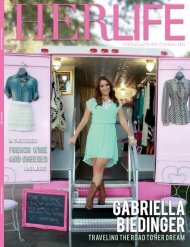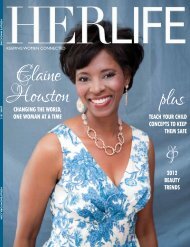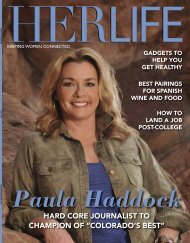keeping women connected - HERLIFE Magazine
keeping women connected - HERLIFE Magazine
keeping women connected - HERLIFE Magazine
You also want an ePaper? Increase the reach of your titles
YUMPU automatically turns print PDFs into web optimized ePapers that Google loves.
herlife | mother’s perspective<br />
Cutting the Apron Strings<br />
How to Raise Happy, Healthy, Independent Kids<br />
by chandra blackwell<br />
If you’re a parent, you know what it’s like<br />
to wish for more sleep, more time and<br />
sometimes more patience. But one thing<br />
a parent hardly ever has to wish for is more<br />
advice...or criticism. Turn one direction and<br />
overprotective (a.k.a. “helicopter”) parents<br />
are being criticized for shielding their<br />
children from even the most minor difficulty<br />
or discomfort and creating, in some minds,<br />
a nation of wimps. Turn the other way, and<br />
mouths stand agape at the concept of freerange<br />
kids, a term coined and popularized<br />
by (in)famous mom Lenore Skenazy, who<br />
allowed her nine-year-old son to navigate the<br />
New York subway system alone. No matter<br />
where you fall on the spectrum, you may<br />
Where is<br />
the happy<br />
medium?<br />
be wondering: where is the happy medium?<br />
How can you cut the apron strings in a<br />
timely and appropriate way, so that your kids<br />
grow up happy, healthy, and confident—but<br />
also safe? The truth is that most kids grow up<br />
way too quickly for a parent’s comfort, but<br />
with a little effort and some deep breathing,<br />
you can support your kids without “hovering,”<br />
and encourage their independence and<br />
self-reliance without leaving them to the<br />
wolves.<br />
Toddlers (1-4)<br />
Resist the Urge to Rescue<br />
As parents, we have a built-in protective<br />
instinct that can make it difficult not to<br />
swoop in and save the day when we see<br />
our children struggling. And sometimes,<br />
of course, that’s appropriate; if<br />
your toddler’s shoelace gets caught<br />
in a sewer grate and there’s a<br />
garbage truck coming, it’s probably<br />
best to do what it takes<br />
to get him out of the street<br />
(and out of harm’s way) as<br />
quickly as possible. However,<br />
if he’s merely struggling<br />
to put his pajamas on by<br />
himself, it’s okay to offer<br />
encouragement from<br />
the sidelines while<br />
he figures it out<br />
on his own, even<br />
if he gets a little<br />
frustrated. It may<br />
quite literally<br />
require sitting on<br />
your own hands<br />
to do it, but encouraging a toddler to work<br />
out his own dilemma can help him begin to<br />
develop a healthy sense of self-reliance.<br />
Big Kids (5-8)<br />
Decisions, Decisions<br />
Even as adults, we depend on others;<br />
very few of us, for example, produce<br />
all of our own food, manufacture our own<br />
vehicles or cut our own hair (more than<br />
once, anyway). So of course, your child will<br />
continue to depend on you to meet certain<br />
basic needs, such as <strong>keeping</strong> her fed and getting<br />
her to the doctor and to soccer games.<br />
However, at this stage of her development,<br />
she should not be too reliant on others for<br />
making basic decisions; while she may rely<br />
on you to provide advice or perspective, she<br />
should be making her own choices in many<br />
situations. As a parent, you can encourage<br />
more independence in your “big kid”<br />
by allowing her to make simple, everyday<br />
decisions on her own: which clothes to<br />
wear (you can intervene to make sure she’s<br />
dressed appropriately for the weather, but<br />
may have to turn a blind eye to some aesthetic<br />
choices), what to order in a restaurant<br />
or which of Kafka’s works best speaks to the<br />
existential dilemma. What’s important here<br />
is that she’s becoming more confident using<br />
her own judgment as she moves toward<br />
more independence.<br />
Pre-teens (8-12)<br />
Talk About It<br />
At this stage, your child’s worldview–<br />
and sphere of influence–has expanded<br />
well beyond the nucleus of your home and<br />
32 <strong>HERLIFE</strong>newyork.com

















